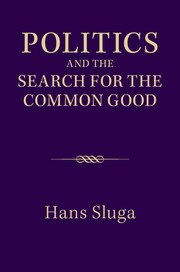Book contents
- Frontmatter
- Contents
- List of figures and tables
- Acknowledgments
- Introduction
- Part I The Search for the Common Good: Beyond the Normative and the Natural
- Chapter 1 From normative theory to diagnostic practice
- Chapter 2 The failings of political naturalism
- Chapter 3 The historization of politics
- Chapter 4 “The time is coming when we will have to relearn about politics”
- Part II Three Diagnostic Thinkers in Pursuit of the Common Good
- Part III The Fragility of the Common Good
- Bibliography
- Index
Chapter 1 - From normative theory to diagnostic practice
Published online by Cambridge University Press: 05 November 2014
- Frontmatter
- Contents
- List of figures and tables
- Acknowledgments
- Introduction
- Part I The Search for the Common Good: Beyond the Normative and the Natural
- Chapter 1 From normative theory to diagnostic practice
- Chapter 2 The failings of political naturalism
- Chapter 3 The historization of politics
- Chapter 4 “The time is coming when we will have to relearn about politics”
- Part II Three Diagnostic Thinkers in Pursuit of the Common Good
- Part III The Fragility of the Common Good
- Bibliography
- Index
Summary
Many political causes call for attention, and engagement on their behalf is surely admirable. But political activism is never enough. Even the most energetic engagement will come to nothing, if we lack political judgment. We can be effective only once we have reached a coherent verdict on what needs to be done and a proper assessment of the situation in which we find ourselves. We certainly can’t advance the human condition if we lack a conception of the common good. Much stands in the way of recognizing this – our eagerness to proceed to action, our unwillingness to stand still for reflection, as well as wrong ways of thinking that have accumulated around our political practice. In consequence, we won’t be able to improve our political condition unless we first change our minds. Our political activism calls for political analysis and political analysis, in turn, for political criticism.
I begin in this chapter with a critique of the normative tradition in political philosophy and will continue in the next one with a critique of political naturalism. On the way I will seek to describe an alternative kind of political thinking – one that is diagnostic in style and hermeneutic in outlook.
- Type
- Chapter
- Information
- Politics and the Search for the Common Good , pp. 11 - 40Publisher: Cambridge University PressPrint publication year: 2014



